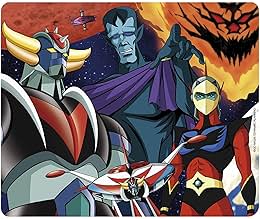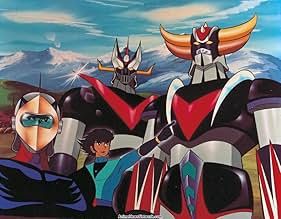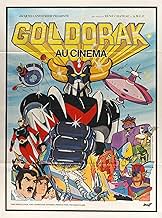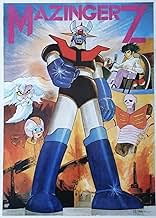AVALIAÇÃO DA IMDb
8,4/10
2,7 mil
SUA AVALIAÇÃO
Adicionar um enredo no seu idiomaThe young Prince of planet Fleed flees his destroyed homeland aboard the UFO Robot Grendizer. On Earth, aided by a scientist and allies, he battles Vega's forces sent to capture Grendizer an... Ler tudoThe young Prince of planet Fleed flees his destroyed homeland aboard the UFO Robot Grendizer. On Earth, aided by a scientist and allies, he battles Vega's forces sent to capture Grendizer and conquer or destroy the universe.The young Prince of planet Fleed flees his destroyed homeland aboard the UFO Robot Grendizer. On Earth, aided by a scientist and allies, he battles Vega's forces sent to capture Grendizer and conquer or destroy the universe.
Explorar episódios
Avaliações em destaque
10paolois
I knew it as Goldrake in my childhood in Italy and I love it above all other cartoons. Japanese animation was massive in Italy at the anime with all sorts themes from mechs like Goldrake, Gundam, Jeep Robot, Mazinga and Daitarn 3 or Captain Harlock to the weird and sinister like Bem to the sweet and romantic like Heidi and Lady Oscar. All massively popular. I would love to see a live action version of Goldrake but the japs are napping on this subject whilst Hollywood subjects us to imitations like Transformers and Pacific Rim for a perceived western audience.
There are at least two United States versions of this series. One (the superior in my opinion) was part of Jim Terry's Force Five, a show composed of five different animated series from Japan. Another is a feature-length "movie" composed of four or five of the show's pivotal episodes spliced together. The Force Five version went all the way through the original series while the "movie" only covers the first "boss villain's" introduction and defeat.
Either way you get it, Grandizer is a fun show. The hero, Duke Fleed (aka Orion Quest) is an experienced pilot right off the bat so they can skip the tedious training and such that seems to be the mainstay of most super and giant robot shows. Grandizer is also interesting in that he doesn't triumph because he is much more powerful than his foes (though he is powerful), he wins because he's *better* than they are.
Duke himself is an alien, physically superior to humans. Also, he is the reluctant hero type. However, he knows it was his fault the Vegan empire came to Earth and it's his responsibility to fight them. He only hesitates for the briefest of moments before unearthing Grandizer and heading into combat once more. His angst is there but not the alpha and omega of his character. Contrast this to shows like Evangelion, in which the characters' angst was all there was to them.
The supporting cast, including Koji Kabuto from "Mazinger Z", come off well with the exception of a midget cowboy apparently put in just to make fun of Americans. Fortunately, he doesn't do much. It's a lot of fun to see how Duke will prove himself superior to Koji from episode to episode. It's as if Go Nagai, creator of both "Grandizer" and "Mazinger Z", didn't really like Koji and wanted to humiliate him at every opportunity.
If you can find the "movie" version, pick it up. It's a lot of fun especially if you enjoy "old-school" super robots. The Force Five version is more satisfying, if you can get ahold of it. I am unaware of any subtitled in English versions of the original Japanese unless you can track down a fan sub.
Either way you get it, Grandizer is a fun show. The hero, Duke Fleed (aka Orion Quest) is an experienced pilot right off the bat so they can skip the tedious training and such that seems to be the mainstay of most super and giant robot shows. Grandizer is also interesting in that he doesn't triumph because he is much more powerful than his foes (though he is powerful), he wins because he's *better* than they are.
Duke himself is an alien, physically superior to humans. Also, he is the reluctant hero type. However, he knows it was his fault the Vegan empire came to Earth and it's his responsibility to fight them. He only hesitates for the briefest of moments before unearthing Grandizer and heading into combat once more. His angst is there but not the alpha and omega of his character. Contrast this to shows like Evangelion, in which the characters' angst was all there was to them.
The supporting cast, including Koji Kabuto from "Mazinger Z", come off well with the exception of a midget cowboy apparently put in just to make fun of Americans. Fortunately, he doesn't do much. It's a lot of fun to see how Duke will prove himself superior to Koji from episode to episode. It's as if Go Nagai, creator of both "Grandizer" and "Mazinger Z", didn't really like Koji and wanted to humiliate him at every opportunity.
If you can find the "movie" version, pick it up. It's a lot of fun especially if you enjoy "old-school" super robots. The Force Five version is more satisfying, if you can get ahold of it. I am unaware of any subtitled in English versions of the original Japanese unless you can track down a fan sub.
To all of you Lebanese people born in the seventies or late sixties, this review goes to you. Picture this: finally being able to set a TV inside a shelter of reinforced concrete in the basement of a 7 stories building in Beirut, watching Grandizer with all the building residents while bombs are falling on that same building and carelessly enjoying it! That's me from 1981 and 1989. The duke of Fleed cares about the earth and its people , Daisky cares about the flowers and birds and yet he is so courageous and powerful and protective. Damn, who cares about real wars, the war of Grandizer to defend the earth is all that matters. A big salute to all Lebanese actors who gave their voices to the Arabic version particularly Jihad Al Atrash and the great Sami Clark. Not less than 10 for the best cartoon ever.
The 3rd of Go Nagai's mecha, Grendizer carries over much of what made Mazinger Z and Great Mazinger successful, but manages to freshen things up. Even though Kabuto Koji is present, it feels a lot more like a standalone series.
The art and the animation are much cleaner than the previous entries in the catalog, often closer to the more polished OVAs. The sound design is also vastly superior.
The silly and often annoying comic relief element is not as omnipresent as it was in Great Mazinger, where Boss is often the focus of attention for much of the episode. In fact, thankfully enough, Boss is only featured in a handful of episodes. Grendizer's own cast of silly characters such as Danbei and Banta is somewhat easier to ignore for the most part. And thankfully, there are no such absurdities as taking crows either.
Even if it's made for kids, the tone is more serious, with romantic and even tragic elements, and the characters have a lot more depth.
And this is reinforced by the extraordinary music of Shunsuke Kikuchi, one of the great Japanese composers of the late 20th century. The score is full of pathos and remarkably dynamic, often reminiscent of Ennio Morricone. The music alone gives much more depth to the series than what you find in Mazinger Z and Great Mazinger.
Of course, the series has its share of fillers but overall it is very enjoyable.
I would recommend watching it in Japanese if you do have that option, as the progression of the series makes more sense. The translated versions can sometimes feel as though they were done in batches of a few episodes, without any real notion of the overarching plot. That being said, I grew up watching it in French, and I can attest that they did a fantastic job with that version, despite some issues. I assume that the same goes for the Arabic and Italian versions, seeing how beloved this series remains in France, Quebec, Italy and some Arab countries almost 50 years later.
The art and the animation are much cleaner than the previous entries in the catalog, often closer to the more polished OVAs. The sound design is also vastly superior.
The silly and often annoying comic relief element is not as omnipresent as it was in Great Mazinger, where Boss is often the focus of attention for much of the episode. In fact, thankfully enough, Boss is only featured in a handful of episodes. Grendizer's own cast of silly characters such as Danbei and Banta is somewhat easier to ignore for the most part. And thankfully, there are no such absurdities as taking crows either.
Even if it's made for kids, the tone is more serious, with romantic and even tragic elements, and the characters have a lot more depth.
And this is reinforced by the extraordinary music of Shunsuke Kikuchi, one of the great Japanese composers of the late 20th century. The score is full of pathos and remarkably dynamic, often reminiscent of Ennio Morricone. The music alone gives much more depth to the series than what you find in Mazinger Z and Great Mazinger.
Of course, the series has its share of fillers but overall it is very enjoyable.
I would recommend watching it in Japanese if you do have that option, as the progression of the series makes more sense. The translated versions can sometimes feel as though they were done in batches of a few episodes, without any real notion of the overarching plot. That being said, I grew up watching it in French, and I can attest that they did a fantastic job with that version, despite some issues. I assume that the same goes for the Arabic and Italian versions, seeing how beloved this series remains in France, Quebec, Italy and some Arab countries almost 50 years later.
Being in North America, I only got 26 episodes of the whole series as a kid. The only reason I remember it is because of the "movie" we rented so often, where Jim Terry Productions had taken scenes from several eps and cut them together, with some fresh voiceovers.
I just got hold of the entire series in Japanese with English subs this year. I had NO idea it had so many underlying themes, like belonging, protecting the environment, learning to rely on others, PTSD, and more. And Hikaru/Brenda's story arc was awesome.
My only gripes are the 70s-style comic relief. Danbi/Panhandle is annoying as hell, whether in English or Japanese. Boss is annoying, and Banta/Carlos usually is, too. It is also very plot-driven, e.g., Koji/Lance lights sticks of dynamite to free Hikaru from a seaweed trap...underwater. And sometimes Duke Fleed/Orion Quest uses the spazer to tag-team against a foe, and sometimes he doesn't. That sort of thing.
But was also the predominant way of writing cartoons back then. That they tackled such heavy themes as the after-effects of war on a person really surprised me.
Oh! One other thing that was so beautiful: almost every episode ends with a view of the sun, either direct or as a background. It was a lovely touch to show that this show is Japanese.
The American version that I watched as a kid erased almost all signs of the show's actual location. Given the American-style ranch, it was easy to do. And although I haven't watched the full French series yet, I've noticed the erasure, too, where possible. Heck, even the subtitles of the Japanese original that I have sometimes erase "Japan" or "Japanese" for English speakers.
But to demonstrate with actual dialogue from the scene in ep 1 where Koji lands his TFO at the ranch:
1. Japanese original: Koji confirms he's Japanese (he says, "Nihonjin"), not an alien.
2. American dub: "I'm more human than you are!" 3. French dub: "I'm a friend."
So, all in all, a beautiful series that's tons of fun, and you can hear the voice actors having fun while they're at it.
"Grendizer, go!"
I just got hold of the entire series in Japanese with English subs this year. I had NO idea it had so many underlying themes, like belonging, protecting the environment, learning to rely on others, PTSD, and more. And Hikaru/Brenda's story arc was awesome.
My only gripes are the 70s-style comic relief. Danbi/Panhandle is annoying as hell, whether in English or Japanese. Boss is annoying, and Banta/Carlos usually is, too. It is also very plot-driven, e.g., Koji/Lance lights sticks of dynamite to free Hikaru from a seaweed trap...underwater. And sometimes Duke Fleed/Orion Quest uses the spazer to tag-team against a foe, and sometimes he doesn't. That sort of thing.
But was also the predominant way of writing cartoons back then. That they tackled such heavy themes as the after-effects of war on a person really surprised me.
Oh! One other thing that was so beautiful: almost every episode ends with a view of the sun, either direct or as a background. It was a lovely touch to show that this show is Japanese.
The American version that I watched as a kid erased almost all signs of the show's actual location. Given the American-style ranch, it was easy to do. And although I haven't watched the full French series yet, I've noticed the erasure, too, where possible. Heck, even the subtitles of the Japanese original that I have sometimes erase "Japan" or "Japanese" for English speakers.
But to demonstrate with actual dialogue from the scene in ep 1 where Koji lands his TFO at the ranch:
1. Japanese original: Koji confirms he's Japanese (he says, "Nihonjin"), not an alien.
2. American dub: "I'm more human than you are!" 3. French dub: "I'm a friend."
So, all in all, a beautiful series that's tons of fun, and you can hear the voice actors having fun while they're at it.
"Grendizer, go!"
Você sabia?
- CuriosidadesWas dubbed to Arabic by (the Lebanese TV company) in Lebanon in the early 80's under the name (Moghamart al Fadaa) and gained a huge popularity among the children, teenager and adults as being one of the first Anime series to be completely dubbed to Arabic.
- ConexõesEdited from SF Saiyûki Starzinger (1978)
- Trilhas sonorasUfo Robot
(Italian Version)
Written by Luigi Albertelli, Ares Tavolazzi and Vince Tempera (as Vince Tempera)
Performed by Cosmic Connection
Principais escolhas
Faça login para avaliar e ver a lista de recomendações personalizadas
- How many seasons does UFO Robo Grendizer have?Fornecido pela Alexa
Detalhes
- Data de lançamento
- País de origem
- Central de atendimento oficial
- Idioma
- Também conhecido como
- UFO Robo Grendizer
- Empresas de produção
- Consulte mais créditos da empresa na IMDbPro
Contribua para esta página
Sugerir uma alteração ou adicionar conteúdo ausente

Principal brecha
By what name was UFO robo: Gurendaizâ (1975) officially released in India in English?
Responda






















